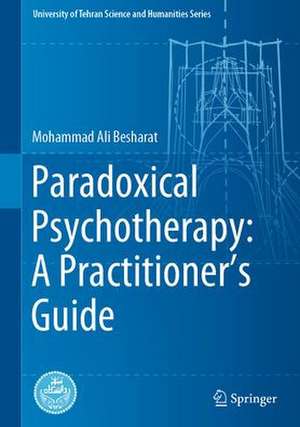Paradoxical Psychotherapy: A Practitioner’s Guide: University of Tehran Science and Humanities Series
Autor Mohammad Ali Besharaten Limba Engleză Hardback – 2 iul 2023
Results of the follow-up studies reported in the present book show that the relapse rate in this model is in its lowest level compared to other psychotherapeutic approaches.
Simple nature of the PTC protocol, described within the present book, allows psychotherapists and clinical practitioners to use this newly developed psychotherapy model for the treatment of mental disorders. This newly developed psychotherapy model can be applied to new developments in the field of psychotherapy theory, research, and practice.
All psychotherapy associations, psychotherapy societies, psychological associations, psychotherapy societies, healthcare organizations, and academic libraries are likely to be part of the readership of this book.
Preț: 783.92 lei
Preț vechi: 825.17 lei
-5% Nou
Puncte Express: 1176
Preț estimativ în valută:
150.02€ • 156.05$ • 123.85£
150.02€ • 156.05$ • 123.85£
Carte tipărită la comandă
Livrare economică 14-28 aprilie
Preluare comenzi: 021 569.72.76
Specificații
ISBN-13: 9783031277160
ISBN-10: 3031277163
Ilustrații: XIII, 172 p. 3 illus., 1 illus. in color.
Dimensiuni: 178 x 254 mm
Greutate: 0.54 kg
Ediția:1st ed. 2023
Editura: Springer International Publishing
Colecția Springer
Seria University of Tehran Science and Humanities Series
Locul publicării:Cham, Switzerland
ISBN-10: 3031277163
Ilustrații: XIII, 172 p. 3 illus., 1 illus. in color.
Dimensiuni: 178 x 254 mm
Greutate: 0.54 kg
Ediția:1st ed. 2023
Editura: Springer International Publishing
Colecția Springer
Seria University of Tehran Science and Humanities Series
Locul publicării:Cham, Switzerland
Cuprins
The PTC perfect model of psychotherapy.- Client #1 (Female, 33 years old, married).- Client #2 (Female, 25 years old, single).- Client #3 (Female, 32 years old, single).- The Effective Mechanisms of Paradoxical Timetable.- Client #4 (Female, 44 years old, married).- Client #5 (Male, 15 years old, single).- Client #6 (Female, 27 years old, married).- Client #7 (Male, 26 years old, married).- Client #8 (Female, 55 years old, married).- Client #9 (Male, 38 years old, married).- Client #10 (Female, 33 years old, single).- Client #11 (Male, 26 years old, single).- Client #12 (Female, 24 years old, married).- Client #13 (Male, 32 years old, single).- Client #14 (Female, 62 years old, married).- Client #15 (Female, 35 years old, married).- Client #16 (Female, 12 years old, single).- Client #17 (Male, 23 years old, single).- Client #18 (Female, 27 years old, divorced).- Client #19 (Male,26 years old, single).- Client #20 (Female, 23 years old, single).- Ending the PTC Treatment.- The Relapse.- The Roles of the Therapist and the Client in the PTC Model.- Ten Questions for Further Thinking.
Textul de pe ultima copertă
This book reports the results of an evidence-based case study for mental disorders which show that PTC has been very successful in bringing about deep and constant therapeutic changes. In response to the need of a more efficient approach for the treatment of psychological disorders, especially the broad spectrum of anxiety disorders, the PTC psychotherapeutic model was developed.
Results of the follow-up studies reported in the present book show that the relapse rate in this model is in its lowest level compared to other psychotherapeutic approaches.
Simple nature of the PTC protocol, described within the present book, allows psychotherapists and clinical practitioners to use this newly developed psychotherapy model for the treatment of mental disorders. This newly developed psychotherapy model can be applied to new developments in the field of psychotherapy theory, research, and practice.
All psychotherapy associations, psychotherapy societies, psychological associations, psychotherapy societies, healthcare organizations, and academic libraries are likely to be part of the readership of this book.
Results of the follow-up studies reported in the present book show that the relapse rate in this model is in its lowest level compared to other psychotherapeutic approaches.
Simple nature of the PTC protocol, described within the present book, allows psychotherapists and clinical practitioners to use this newly developed psychotherapy model for the treatment of mental disorders. This newly developed psychotherapy model can be applied to new developments in the field of psychotherapy theory, research, and practice.
All psychotherapy associations, psychotherapy societies, psychological associations, psychotherapy societies, healthcare organizations, and academic libraries are likely to be part of the readership of this book.
Caracteristici
Presents a very easy friendly non-aggressive treatment approach for both the therapist and the patient Covers the treatment of a broad spectrum of mental disorders in a very short-term period Help the patient to become one's own therapist at the end of the PTC treatment






